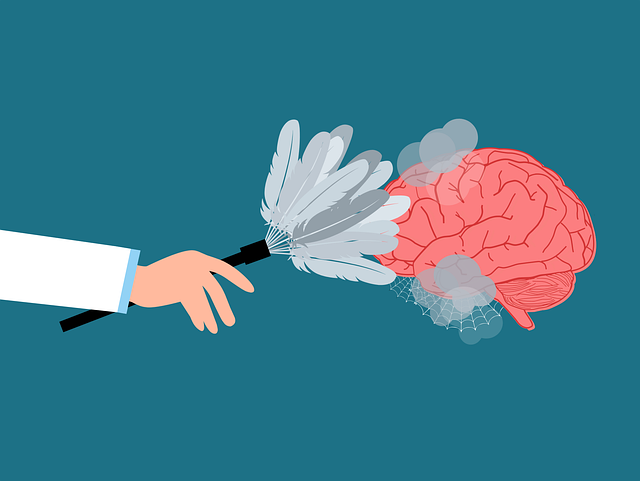Mental Health Crisis Hotlines like Broomfield Chronic Illness Therapy's offer 24/7 support, connecting individuals with trained professionals for severe anxiety, depression, and psychotic episodes without in-person visits. These hotlines promote cultural sensitivity, self-care routines, stress management, and coping strategies, providing a sense of control during crises and contributing to long-term well-being. Broomfield Chronic Illness Therapy provides specialized support for mental health crises linked to chronic illnesses through evidence-based practices like mood management and mindfulness exercises. Digital tools integrated into hotlines, such as telemedicine and apps, enhance accessibility, data collection, and personalized support, while public awareness campaigns combat stigma and encourage help-seeking behaviors in diverse communities facing these interconnected challenges.
“In today’s fast-paced world, mental health crisis hotline support services play a pivotal role in assisting individuals navigating turbulent times. This article delves into the critical functions of these hotlines, highlighting the expertise offered by Broomfield Chronic Illness Therapy. We explore how accessing these services can provide much-needed aid and discuss common challenges faced by users. Additionally, we examine the potential of technology to enhance crisis response, ensuring timely interventions. Understanding these hotlines is a crucial step towards fostering healthier communities.”
- Understanding Mental Health Crisis Hotlines
- The Role of Broomfield Chronic Illness Therapy
- Accessing and Utilizing Support Services
- Common Challenges Faced by Users
- Enhancing Crisis Response Through Technology
Understanding Mental Health Crisis Hotlines

Mental Health Crisis Hotlines are vital resources designed to provide immediate support and guidance during intense emotional distress or mental health crises. These services offer a safe space for individuals to connect with trained professionals who can offer assistance 24/7. Whether it’s a case of severe anxiety, depression, or psychotic episodes, these hotlines ensure quick access to expert care without the need for an in-person visit.
Services like Broomfield Chronic Illness Therapy prioritize cultural sensitivity in mental healthcare practice, ensuring that support is tailored to meet the unique needs of diverse individuals. They also promote self-care routine development for better mental health by teaching effective stress management techniques and coping strategies. By utilizing these hotlines, people can gain a sense of control during challenging times, offering a crucial step towards long-term well-being.
The Role of Broomfield Chronic Illness Therapy

Broomfield Chronic Illness Therapy plays a vital role in addressing mental health crises by offering specialized support tailored to individuals grappling with chronic illnesses. This therapy goes beyond treating symptoms; it focuses on empowering patients to manage their mental wellness effectively. By integrating evidence-based practices, such as mood management techniques and mindfulness exercises, the therapy equips clients with tools to navigate emotional challenges that often accompany chronic health conditions.
Incorporating Mental Wellness Journaling Exercise Guidance within Broomfield Chronic Illness Therapy allows individuals to introspect and express their feelings in a safe space. This process facilitates self-awareness and helps patients identify patterns in their mental states, thereby promoting better coping strategies. By fostering a deeper understanding of their emotions and utilizing Mind Over Matter principles, individuals can develop resilience and improve their overall quality of life despite the challenges posed by chronic illness.
Accessing and Utilizing Support Services

Accessing support services for mental health crises is a vital step towards recovery and well-being. Individuals facing emotional distress can reach out to dedicated hotline numbers, offering immediate assistance and guidance. These hotlines are designed to be easily accessible, often available 24/7, ensuring help is available whenever needed. The process typically involves calling the designated number, where trained professionals answer, providing a safe and non-judgmental space for individuals to express their concerns.
Broomfield Chronic Illness Therapy, for instance, offers specialized support through its hotline, catering to those seeking emotional intelligence-based solutions. This approach recognizes the importance of cultural sensitivity in mental healthcare practice, ensuring diverse communities feel welcomed and understood. Additionally, the Mental Wellness Podcast Series Production can provide valuable resources, offering educational content and personal narratives that promote a deeper understanding of mental health issues, encouraging help-seeking behaviors and fostering a supportive environment for those in need.
Common Challenges Faced by Users

Many individuals facing mental health crises often struggle with a range of challenges that can complicate their journey to recovery. One significant hurdle is the stigma surrounding mental illness, which may deter them from seeking help in the first place. This societal stigma, coupled with personal fears or concerns about privacy, can make it hard for people to open up and access the support they desperately need.
Additionally, those dealing with chronic illnesses often face unique obstacles. Broomfield Chronic Illness Therapy highlights that these individuals might require specialized care, as their mental health struggles may be exacerbated by physical conditions. Burnout prevention is crucial here, as both mental and chronic illness support professionals must manage their own well-being to effectively assist others. Public awareness campaigns development can play a vital role in educating the public about these interconnected issues, fostering an environment of understanding and encouraging help-seeking behaviors.
Enhancing Crisis Response Through Technology

The digital age has presented an opportunity to revolutionize mental health crisis response through innovative technology solutions. Online platforms and mobile apps are now integral parts of many crisis hotline services, offering immediate support and resources to those in distress. For instance, Broomfield Chronic Illness Therapy has successfully integrated telemedicine into its community outreach program, enabling professionals to conduct risk assessments remotely and provide timely interventions.
This shift not only enhances accessibility but also allows for continuous monitoring and management of mental health issues. With the help of digital tools, crisis hotline operators can gather valuable data during initial interactions, facilitating more effective support tailored to individual needs. Furthermore, technology facilitates connections between individuals in need and relevant community resources, fostering a collaborative approach to stress management and overall well-being.
Mental health crisis hotlines play a vital role in providing immediate support, but enhancing these services through technology and specialized centers like Broomfield Chronic Illness Therapy can significantly improve long-term outcomes. By addressing common challenges and integrating innovative solutions, we can ensure that individuals in crisis receive the comprehensive care they need. Accessing these resources promptly can be life-changing, offering a lifeline for those struggling with their mental health.














